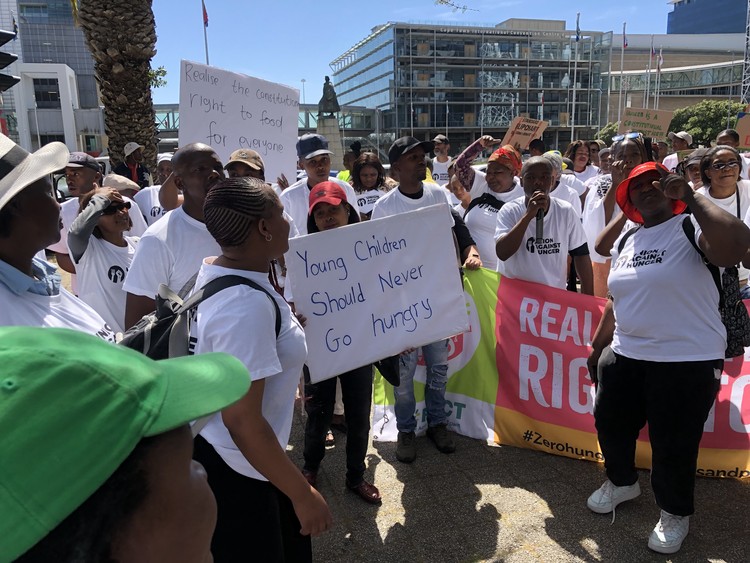
18 October 2025
The Union Against Hunger is demanding urgent government intervention to end child hunger. Photo: Mary-Anne Gontsana
More than a hundred activists marched in Cape Town on Friday, urging the government to respond to a growing hunger crisis in South Africa. Many of them work in community kitchens on the Cape Flats,
The activists, under the banner of the “Union Against Hunger”, had hoped to hand over a memorandum to President Cyril Ramaphosa, who was speaking in the convention centre at a Social Justice Summit, but no one came out to accept the memorandum. Activist Mark Heywood then went into the building and was able to hand it to a Presidency official.
The joint memorandum is by Union Against Hunger, the Healthy Living Alliance (HEALA), Grow Great, Abahlali baseMjondolo, Women on Farms Project, Real Reform for ECD, and the South African Federation of Trade Unions. It calls on the government to introduce legislation to eliminate food waste, lead a national campaign to drastically reduce malnutrition in children, and establish a national food commission to bring an end to hunger.
A parliamentary question revealed last year that about 1,450 children under the age of five died of acute malnutrition in 2023. According to one estimate, food insecurity affects over 60% of households in the country, and about a quarter of children in South Africa are stunted due to malnutrition.
Union Against Hunger member Busiso Moyo said that the march came a day after World Food Day. The Social Justice Summit happening in the convention centre was about “food security, sustainability and solidarity,” he said. “We saw this as a platform … to contribute to the resolutions that will come out.”
“It is a constitutional right that everyone must have access to sufficient food,” said Nzama Mbalati, CEO of HEALA. “We have taken it upon ourselves as civil society to build knowledge within communities on the plight of hunger.”
Sean Samson, from the Alcardo Andrews Foundation, said their community kitchen serves at least 1,000 meals a day. “People are surviving on very little, and as private citizens, we cannot do it all on our own. There needs to be a permanent solution.”
Phelisa Mashiyi of the Callas Foundation, which runs a community kitchen program, said such kitchens were doing what the government was supposed to be doing.
“We are under-resourced. We are tired. We are using money from our own pockets to serve and feed our neighbours.”